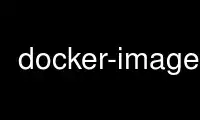
This is the command docker-images that can be run in the OnWorks free hosting provider using one of our multiple free online workstations such as Ubuntu Online, Fedora Online, Windows online emulator or MAC OS online emulator
PROGRAM:
NAME
docker-images - List images
SYNOPSIS
docker images [--help] [-a|--all] [--digests] [-f|--filter[=[]]] [--no-trunc] [-q|--quiet]
[REPOSITORY[:TAG]]
DESCRIPTION
This command lists the images stored in the local Docker repository.
By default, intermediate images, used during builds, are not listed. Some of the output,
e.g., image ID, is truncated, for space reasons. However the truncated image ID, and often
the first few characters, are enough to be used in other Docker commands that use the
image ID. The output includes repository, tag, image ID, date created and the virtual
size.
The title REPOSITORY for the first title may seem confusing. It is essentially the image
name. However, because you can tag a specific image, and multiple tags (image instances)
can be associated with a single name, the name is really a repository for all tagged
images of the same name. For example consider an image called fedora. It may be tagged
with 18, 19, or 20, etc. to manage different versions.
OPTIONS
-a, --all=true|false
Show all images (by default filter out the intermediate image layers). The default is
false.
--digests=true|false
Show image digests. The default is false.
-f, --filter=[]
Filters the output. The dangling=true filter finds unused images. While
label=com.foo=amd64 filters for images with a com.foo value of amd64. The label=com.foo
filter finds images with the label com.foo of any value.
--format="TEMPLATE"
Pretty-print containers using a Go template.
Valid placeholders:
.ID - Image ID
.Repository - Image repository
.Tag - Image tag
.Digest - Image digest
.CreatedSince - Elapsed time since the image was created.
.CreatedAt - Time when the image was created..
.Size - Image disk size.
--help
Print usage statement
--no-trunc=true|false
Don't truncate output. The default is false.
-q, --quiet=true|false
Only show numeric IDs. The default is false.
EXAMPLES
Listing the images
To list the images in a local repository (not the registry) run:
docker images
The list will contain the image repository name, a tag for the image, and an image ID,
when it was created and its virtual size. Columns: REPOSITORY, TAG, IMAGE ID, CREATED, and
SIZE.
The docker images command takes an optional [REPOSITORY[:TAG]] argument that restricts the
list to images that match the argument. If you specify REPOSITORYbut no TAG, the docker
images command lists all images in the given repository.
docker images java
The [REPOSITORY[:TAG]] value must be an "exact match". This means that, for example,
docker images jav does not match the image java.
If both REPOSITORY and TAG are provided, only images matching that repository and tag are
listed. To find all local images in the "java" repository with tag "8" you can use:
docker images java:8
To get a verbose list of images which contains all the intermediate images used in builds
use -a:
docker images -a
Previously, the docker images command supported the --tree and --dot arguments, which
displayed different visualizations of the image data. Docker core removed this
functionality in the 1.7 version. If you liked this functionality, you can still find it
in the third-party dockviz tool: ⟨https://github.com/justone/dockviz⟩.
Listing only the shortened image IDs
Listing just the shortened image IDs. This can be useful for some automated tools.
docker images -q
HISTORY
April 2014, Originally compiled by William Henry (whenry at redhat dot com) based on
docker.com source material and internal work. June 2014, updated by Sven Dowideit
⟨[email protected]⟩
Use docker-images online using onworks.net services
